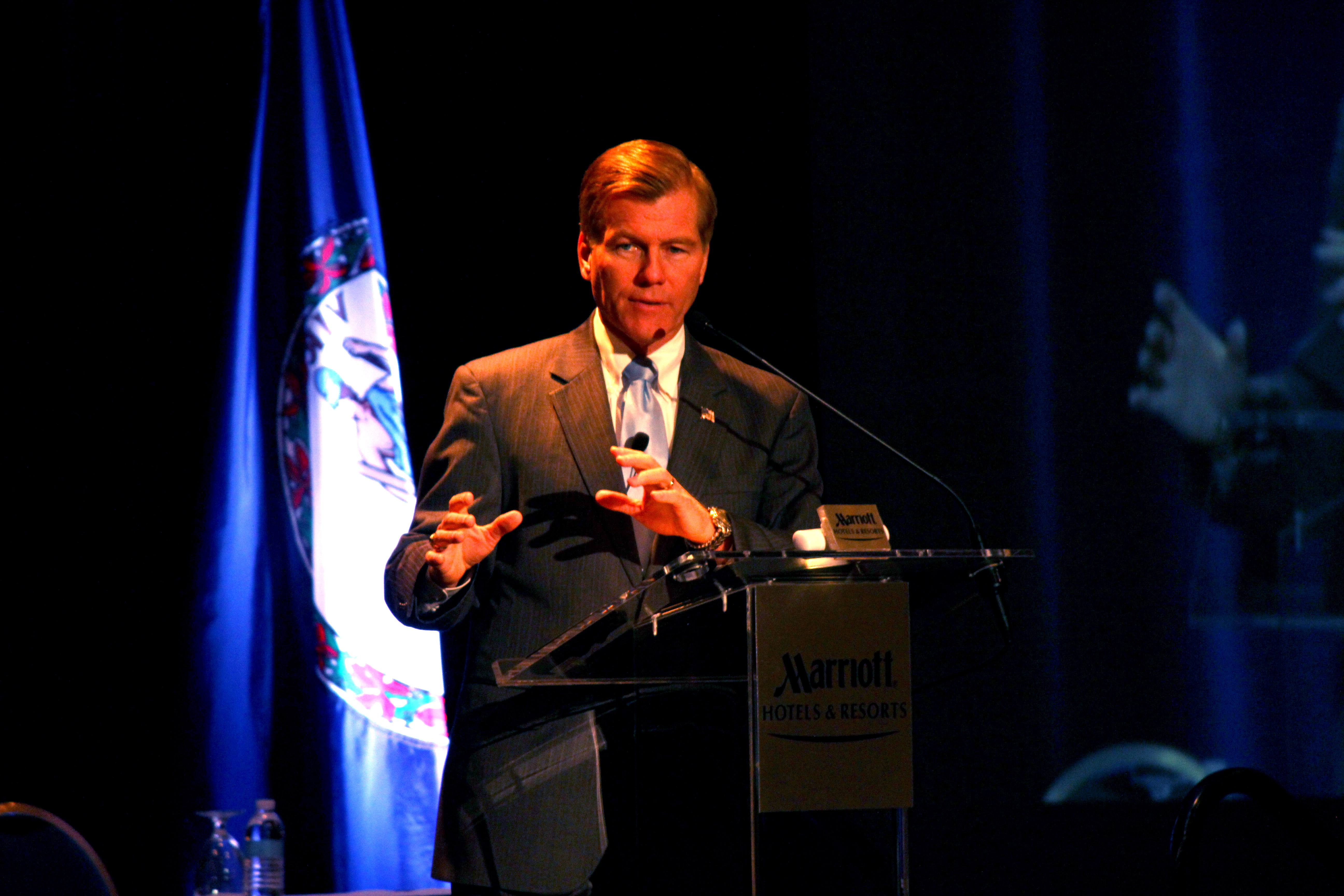Virginia Gov. Robert F. McDonnell spoke for 45 minutes Friday afternoon with students at the University of Virginia’s Frank Batten School of Leadership and Public Policy, taking the opportunity to share leadership tips while reflecting on his own legacy and the biggest challenges facing the next governor.
“You all are going to be future leaders,” he said to the audience of about 75, mostly Batten students, gathered in the Great Hall of Garrett Hall.
“No matter what field you go into, leadership is tremendously important,” he said. “The direction an organization takes is going to be determined by the vision, motivation, resources and strategy the leaders employ.”
Speaking as the annual Graduate Batten Council Speaker, McDonnell, who was elected in 2009 and has about eight months remaining in his term, shared leadership lessons drawn from his own experience.
A leader first “must know what you believe in,” and then must set goals, said McDonnell, who listed creating jobs and promoting economic development as his top priority, including “making Virginia the most business-friendly state in the nation, and making it the business capital of the eastern United States.”
Another goal was to slow the increases in tuition costs at Virginia colleges, which had been “growing at 10 percent a year for 10 years,” he said.
“I was writing those checks. I have five kids; two of them are here at U.Va.,” he said. “That’s unacceptable, unsustainable and immoral to continue these tuition increases. We’ve got to find other ways to put more resources and more accountability.”
McDonnell also discussed the recent passage of a bill that overhauls the state’s transportation funding structure. The Washington metropolitan area, including Northern Virginia, is the most congested area in the country, and leaders in Richmond have been talking about finding a solution for more than 25 years, he said. “We took on the age-old intractable problem of transportation funding. ... We came up with plan that will fix the problem for a generation.”
As he thanked the Batten School for hosting his cabinet retreat in September, he noted that he and his cabinet used the retreat to score themselves on more than 300 campaign promises.
“You must have goals, measure yourself and hold yourself more accountable than anyone else will,” he said.
A leader must also adopt a style that works, McDonnell said. “Even if you have a talented team, working together around a shared goal, the style and character of leadership will determine your effectiveness.”
McDonnell cited Jim Collins’ book, “Good To Great,” for his “most important point about leadership.” The book summarizes a decade of research, including case studies of numerous businesses, to identify the “X factor” that distinguishes great leaders and organizations from good ones, McDonnell said. Collins identified humility as the key characteristic of a great leader.
“He said these are people that were motivated and aggressive and passionate, to be able to grow the organization – not for themselves or their own accolades or self-aggrandizement or compensation, but for the good of their organization and all the people working for it,” McDonnell said.
Asked by a student what he would consider his greatest legacy, McDonnell noted that many will point to his transportation bill, and ultimately his legacy “is up to others to reflect upon and determine.”
“We put a premium on making government work better, and we managed the fiscal resources of the commonwealth well,” he said. “Of all the things, that’s what I feel good about.”
Another student asked him to name the biggest challenges the next governor will face. He cited the nation's “crushing debt,” projected to balloon in the next five to 15 years.
“If we don’t get a handle on spending and debt in our country, I’m really afraid of the kind of challenges that you young people will face going forward,” he said. “It's crushing. I think it's immoral. It's unsustainable. That's why I tried, as governor, to not do anything that would add to the national debt by drawing down federal funds, or taking on new obligations or entitlements.”
Virginia is one of the states that depends most on federal spending, with 19 military bases and the Pentagon, and will be affected more than any other state by the spending cuts required by sequestration, he said. “As tough as it is, it’s something we’ve got to do. My only problem is the sequestration focuses too much on military cuts, and not enough in some of the other areas.”
Citing the 10th Amendment, which states that all powers not granted to the federal government by the Constitution shall be reserved to the states or the people, McDonnell said, “We've got to really wrestle with how do we realign the basic federal structure that this country was founded upon, give new life to the 10th Amendment, and have states and the federal government work a little bit better together so that spending is kept in check. That's one of my great concerns for the future.”
He gave his audience one final admonition before departing: “Dream big, be humble, and our country will be better off.”
Media Contact
Article Information
April 8, 2013
/content/mcdonnell-shares-leadership-insights-uva-s-batten-school

